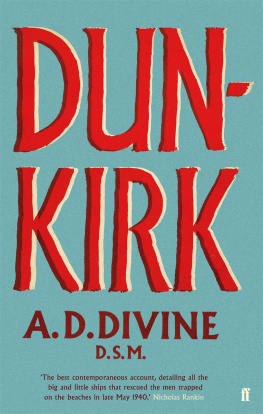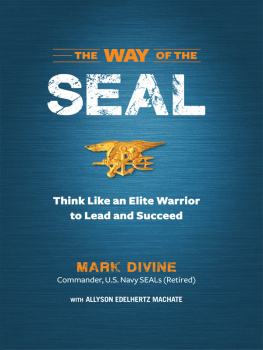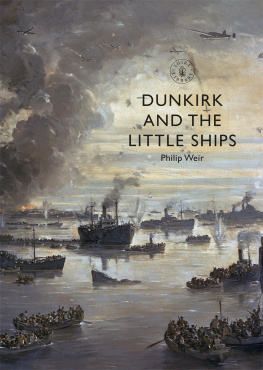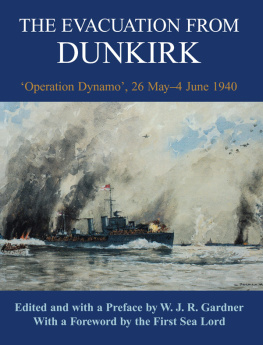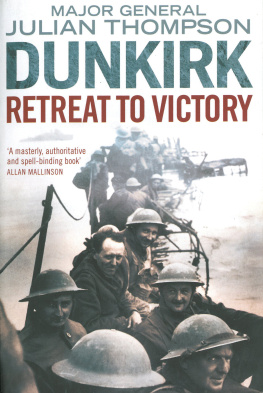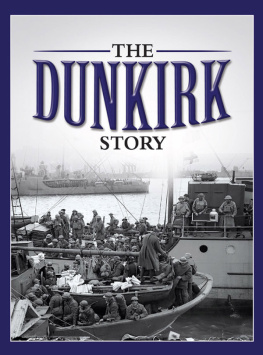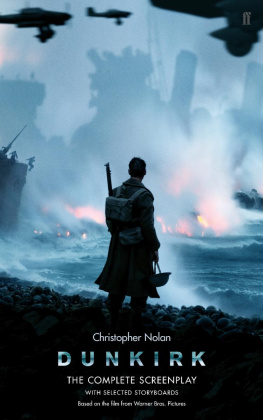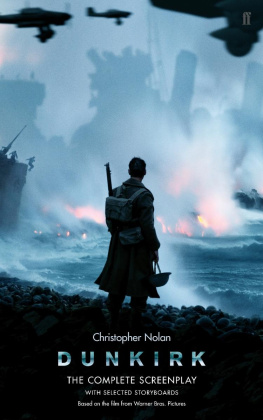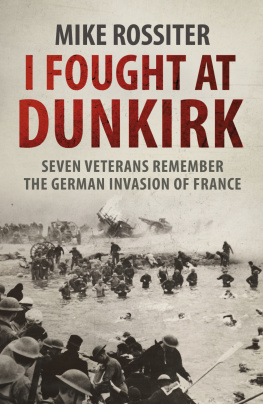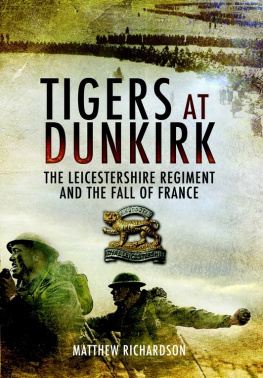by Nicholas Rankin
The journalist David Divine did more to spread the patriotic legend of Dunkirk than any other writer. He directly experienced Operation Dynamo in 1940, getting both a wound and a medal, wrote the first novel about the evacuation, The Sun Shall Greet Them (Collins, 1941), and two separate histories chronicling the naval side of the dramatic events of MayJune 1940, both published by Faber & Faber. Dunkirk was the first to appear in 1945; The Nine Days of Dunkirk was released in 1959.
Yet he is largely forgotten today. In more recent narratives, such as Hugh Sebag-Montefiores Dunkirk: Fight to the Last Man (Viking, 2006), Julian Thompsons Dunkirk: Retreat to Victory (Sidgwick & Jackson, 2008) and Joshua Levines Dunkirk: The History Behind the Major Motion Picture (HarperCollins, 2017), A. D. Divine does not figure in their notes or bibliographies. But why?
Basically, there are two simple ways of retelling Dunkirk: as tragedy or as triumph. On the one hand, as Winston Churchill frankly declared in the House of Commons on 4th June 1940, it was a colossal military disaster. On the other, in the same speech the Prime Minister also called the evacuation of the British Expeditionary Force a miracle of deliverance, achieved by valour, by perseverance, by perfect discipline, by faultless service, by resource, by skill, by unconquerable fidelity. The inquisitive modern historian finds the disaster more interesting than the dutiful virtues. Twenty-first-century readers understand that not everybody was brave and disciplined, and that service was fallible. We want to know more about the chaos, the cock-ups and the cowardice.
The ignoble side of Dunkirk first emerged in Richard Colliers controversial book The Sands of Dunkirk (Collins, 1961). Another revisionist historian, Nicholas Harman, in the source notes of his own provocation Dunkirk: The Necessary Myth (Hodder & Stoughton, 1980), wrote that in assembling a day-by-day account of the evacuation, David Divines Nine Days of Dunkirk was indispensable. He was there and, more important, he interviewed many participants who are now dead. But he added: It is no criticism of Divine to say that he tended to accentuate what was positive about British actions at Dunkirk. Harman had known Divine as a journalist colleague at the Sunday Times and learned to like him a lot. He was always accurate and always intensely patriotic; however although he contributed much to our understanding of how the evacuation took place, he also left things out.
So how did the writer David Divine come to fulfil this role of semi-official propagandist? He was one of that great generation of journalists from the
In late May 1940, the thirty-four-year-old freelance writer (already with twenty books under his belt) was among the journalists milling around Dover, overlooking the English Channel. On page 24 of this book, Divine describes watching the shelling of Boulogne from the White Cliffs. This determined young man was already an amateur sailor and, through his contacts in the Ministry of Information and the Admiralty, had by 31st May acquired the papers that put him in the navy for thirty days. He told Walter Lord, author of The Miracle of Dunkirk (Viking, 1982), that he went to Ramsgate, looked over the commandeered small craft piling up in the harbour, and picked out for himself a 28-foot, Bermuda-rigged yawl called Little Ann. With no formal assignment, he jumped aboard and began getting her ready for sea. He was soon joined by a kindred soul Divine never learned his name and with a couple of others they set out for Dunkirk early on Saturday 1st June.
At some point, Little Ann ran aground on a sand-bar and had to be abandoned. Divine hitched a ride back to Ramsgate, and this time picked out a 30-foot, twin-screw Thames motor cruiser called White Wing to steal, before he was told that a senior naval officer also required the craft. So it was that David Divine steered the boat that took Rear Admiral A. H. Taylor, the man in charge of Operation Dynamos Small Vessels Pool in Sheerness, across the English Channel to organise the evacuations of the last small parties from Malo-les-Bains.
They left at 8.45 p.m. on Sunday 2nd June. They were shelled and shot at and saw tragic things, as recorded laconically on page 223. At some point, Divine was wounded in the stomach. He subsequently gained the Distinguished Service Medal (D.S.M.), which is awarded to petty officers and ratings of the Royal Navy (as well as non-commissioned officers and other ranks of the Royal Marines) for acts of bravery in the face of the enemy not sufficiently meritorious to make them eligible for the Conspicuous Gallantry Medal (C.G.M.).
Another Sunday Times journalist, Phillip Knightley, wrote a famous book, The First Casualty: The War Correspondent as Hero, Propagandist, and Myth Maker (1975, revised 2000), which has a footnote about Divine at Dunkirk on page 253. It reads: David Divine, a free-lance, who had written a few navy propaganda books, persuaded the navy to let him watch the evacuation. Divine was wounded and wrote his well-known book on Dunkirk from his hospital bed. Although Divine later became a war correspondent of note, he was not one at that time. Only the last sentence is correct, however. On page 2 of Dunkirk, Divine lists six of his previous books, five of which could be described as navy propaganda, while Road to Tunis (Collins, 1944) recounted his time as a British war correspondent with the American Combat Forces in North Africa in 19423. Nonetheless, all six books were written after his experience of Dunkirk. As for what Knightley calls his well-known book on Dunkirk, Dunkirk was not commissioned until 1944, long after Divine left hospital. He did, however, help the Poet Laureate John Masefield with his pamphlet, The Nine Days Wonder, which Heinemann published in 1941.
Whatever revisionists may say, Dunkirk remains a good, strong book, most valuable for its vivid contemporaneous accounts from the Little Ships, many of which were collected by an eminent barrister, Joshua David Casswell, K.C., and handed over to David Divine to collate. Divine tells their stories well, fitting the individuals into the institutions that co-ordinated them. Without such organisation by the Royal Navy and the Merchant Navy, we clearly come to understand that it would have been impossible to evacuate the 338,000 men who reached England. Dunkirk is a book that names many names, giving credit where credit is due.
Appendix B lists the ships that took part and Appendix C contains the full list of all the honours and awards after Dunkirk. First on the list is the knighthood for the great Vice Admiral Bertram Home Ramsay, the Flag Officer Commanding Dover, who went on from the evacuation of Dunkirk to organise the Allied landings in North Africa in 1942, Sicily in 1943 and Normandy in June 1944. David Divine, whose own award appears on page 296, was lucky enough to talk to Ramsay about Dunkirk before the admiral was killed in a plane crash in France on 2nd January 1945.
For anyone impressed by Christopher Nolans spectacular 2017 film, Divines Dunkirk provides true-life stories. It would take a heart of stone not to be moved by them.
Ramsgate, October 2017
Divine also rewrote the screenplay of the British war film Dunkirk, starring John Mills, Bernard Lee and Richard Attenborough. His interventions meant that the British Army was happy to provide 6,500 soldiers for filming at Camber Sands in May 1957, at a cost of 35,000. See S. P. Mackenzie, Victory from Defeat: The War Office and the making of

